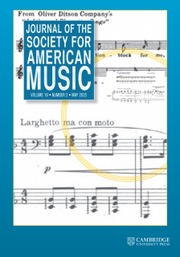Article contents
Diasporic Dialogues in Mid-Century New York: Stefan Wolpe, George Russell, Hannah Arendt, and the Historiography of Displacement
Published online by Cambridge University Press: 09 May 2012
Abstract
This article explores mid-century New York intellectual scenes mediated by the avant-garde émigré composer Stefan Wolpe (1902–72), with special emphasis on Wolpe's interactions with jazz composer George Russell (1923–2009) and political philosopher Hannah Arendt (1906–75). Cross-disciplinary communities set the stage for these encounters: Wolpe and Russell met in the post-bop circles that clustered in Gil Evans's basement apartment, while Wolpe encountered Arendt at the Eighth Street Artists’ Club, the hotbed of Abstract Expressionism. Wolpe's exchanges with Arendt and Russell, long unacknowledged, may initially seem unrelated. Yet each figure shared a series of “cosmopolitan” commitments. They valued artistic communities as spaces for salutary acts of cultural boundary crossing, and they tended to see forms of self-representation in the arts as a way to respond to the dehumanizing political disasters of the century. Wolpe and Arendt focused on questions of human plurality in the wake of their forced displacements as German-Jewish émigrés, whereas Russell confronted dilemmas of difference as an African American migrant from southern Ohio in New York. Bringing together interpretive readings of music with interview- and archive-based research, this article works toward a historiography of aesthetic modernism that recognizes migration as formative rather than incidental to its community bonds, ethical aspirations, and creative projects.
- Type
- Research Article
- Information
- Copyright
- Copyright © The Society for American Music 2012
References
References
- 4
- Cited by




